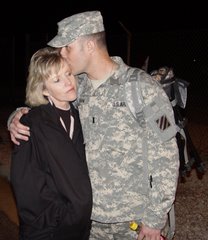Multi-National Division - Center PAO
COMBAT OUTPOST CLEARY, Iraq - Lt. Col. Jack Marr has a positive outlook on what has been a rough and bumpy road to a peaceful and successful Salman Pak community.
“It’s getting better every day,” said Marr, of Minneapolis, commander of 1st Battalion, 15th Infantry Regiment, 3rd Heavy Brigade Combat Team, 3rd Infantry Division. “There is no one solution that will completely solve this problem.”
Salman Pak is a town in the southern most portion of the Mada’in Qada, where the 3rd Heavy Brigade Combat Team assumed control in early April. It’s a historic area where Soldiers and leaders of the 1-15 Inf. Regt. have continued to combat adversity and controversy since their arrival.
The area has not always had such a dismal reputation. According to Marr, Salman Pak is rich with historical significance. The city is mentioned in the Bible, in the book of Ezra, and has historical markers such as the Ctesiphon Arch and the Salman al-Frasi Mosque dedicated to Salman the Persian, the first non-Arab convert to Islam.
Marr said Salman Pak was also a resort city in the beginning of Saddam Hussein’s rule over Iraq. Still in the area are run down hotels and convention centers where 1-15 Inf. Regt. Soldiers have found various pictures and post cards of what once was.
Capt. Steve Schmidt, of Sunnyvale, Calif., battalion fire support officer, said the area was a vacationing center for high society Sunni leaders.
“If you look down from the top of the Panorama Building (a run-down structure overlooking Salman Pak,) you can see the remains of a swimming pool,” he said.
Before 1-15 Inf. Regt. arrived in Salman Pak, there was a National Police presence in the area. However, they were harsh in how they dealt with the local populace. There was also known corruption within the city, Marr explained.
“The people of Salman Pak left and the government was not functioning,” he said. “The buildings were abandoned and the National Police moved into them. They really had no place to work. Since 1-15 arrived, the people have moved back to the area.”
Since the National Police do not currently have a headquarters building they can call their own, they take over buildings such as schools, libraries and hospitals thus shutting down some or all operation within the building, Schmidt explained.
“With the National Police occupying these buildings,” Schmidt said, “they are turning the buildings into magnets for attacks.”
To combat this problem, Marr said Soldiers are currently working with the Mayor of Salman Pak to choose a location for a new FOB where the National Police can set up their headquarters. Marr said the project will begin soon.
Another problem both Marr and Schmidt expressed was the lack of security on the main route into Salman Pak.
“Many males feel they can’t travel freely on the route,” Marr said. “They feel as though they will be killed or kidnapped if they travel on that route.”
This concern makes it difficult to get supplies and resources into the city. Schmidt gave an example regarding school testing in the area. School kids in ninth and 12th grades must conduct a test to determine where they are in their education and where they would best be suited in the community. The test also determines which students would best be suited for college.
“The lack of security on the route did not allow for testers to come to Salman Pak,” Schmidt said. “They ended up moving the test to Jisr Diyala but very few kids showed up to take the test. They just didn’t feel safe.”
Marr is concerned that the lack of testing in Salman Pak will result in a low number of the area’s school children furthering their education at universities.
He said his unit is taking a bigger role in humanitarian assistance for Salman Pak. Soldiers provide convoy escorts along the dangerous route so trucks bringing fuel, water, propane, kerosene and other supplies and resources can make their way safely into the area.
He believes the humanitarian efforts will also prevent residents from, once again, migrating away from Salman Pak.
Currently, Marr said his unit is working on projects to better the quality of life for the citizens of Salman Pak.
“One-15 is currently overseeing the construction of a health care clinic,” he said. “They (local government) are doing repairs on several unoccupied schools, cleaning up the streets, and replacing concertina wire and jersey barriers around the city with decorative cement pots. They are in the planning phases of funding and building a new fire station, government center and high school.”
Salman Pak, as of today, is not recognized as a Nahia, or local council, and cannot hold regular elections. Marr said before he leaves, he would like to see the council recognized and paid by the government of Iraq.
Although Salman Pak is in the beginning stages of building a self-reliant community, where violence and chaos is scarce or non-existent, Marr is hopeful and can see the ever-improving relationship with his Soldiers and the local community.
“It’s completely a matter of trust,” he said. “We are building and providing visible, tangible alternatives to the seditious rhetoric of the extremists in this area.”
Marr also sees great potential in the local population of Salman Pak.
“If they can get through the separation and balance Sunni and Shia services of life, they have a chance at success,” he said.
Tuesday, September 11, 2007
Subscribe to:
Post Comments (Atom)





No comments:
Post a Comment